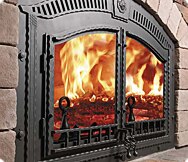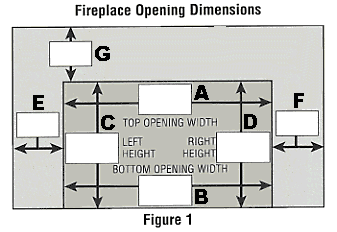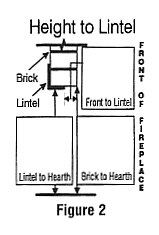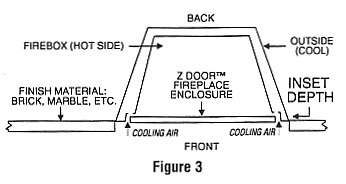How to Measure for Fireplace Doors
Jun 5th 2020

First determine if your fireplace is a factory built prefabricated fireplace (zero-clearance) or a masonry type fireplace. The easy way to tell is to look at the chimney. If you have an all masonry chimney (brick & mortar with clay tile liners) then you have what is considered a masonry fireplace. If your chimney is a metal chimney pipe (usually with a round chimney cap) then you have a pre-fabricated fireplace.
When installing fireplace glass doors, correctly measuring your fireplace is crucial. We have put together a guide to help you accurately measure your masonry or prefab or zero clearance fireplace.
Measuring Masonry Fireplaces
Be sure to take all measurements to the nearest 1/16" using a steel tape measure. For complex custom applications, a photograph of the fireplace will be very helpful. Be sure to look for projecting bricks, rotary damper handles, or any other issues that may cause a problem when mounting your fireplace door. For questions please contact one of our fireplace door experts Toll Free at 877-734-2458
There are two types of fit, Overlap Fit and Inside Fit. The overlap fit is when the fireplace door is larger than the fireplace opening and the door will overlap the brick, marble, etc. An inside fit is when the fireplace door fits inside the fireplace opening and will be flush with the brick, marble, etc. The most common is the overlap fit but if you have rough field stone or bricks protruding, then the inside fit may be more appropriate. The inside fit requires more precise measuring and is used with custom enclosures only. All stock doors utilize an overlap fit. In general, you will usually obtain a better fit and easier installation when you use the overlap fit, when possible.
Overlap Fit
Measure the width of the opening at the top and again at the bottom. We need the minimum and maximum width (A). It might be helpful to print this page and use Figure 1 for all your measurements.
Next, measure the height of the opening from the hearth (where the enclosure will sit) to the top of the fireplace opening. If there is no hearth extension or you have a raised firebox, you will need to overlap the bottom of the opening (picture frame mount). To aid in this installation, you will need to use a suspension bar. The suspension bar drops down 5/8", therefore adding 5/8" to the effective opening.
If 2 sizes will fit your opening it is best to go with the smaller size frame option.

FIREPLACE GLASS DOORS
Fireplace glass doors have been proven to decrease the potential for injury to those you care about and also reduce the risk of damage to your home.
Shop Now

Inside Fit
Measure the width of the opening at the top and again at the bottom. We need the minimum width. See figure 1. Next, measure the height of the opening from the hearth (where the enclosure will sit) to both the bottom of the lintel bar, and to the bottom of the finishing material (brick, marble, etc.) See figure 2.
Notes on Inside Fit Enclosures:
-
Width - For example, if the top width is 42" and the bottom width is 41 1/2", we will make the enclosure 41 1/4" wide allowing 1/8" clearance tolerance on each side. This means that at the top, there would be a 3/8" gap (in this example) between the side panel and the fireplace opening on each side. Generally the clearance gaps can be filled from the backside of the frame using high temperature RTV silicone. If the gaps become excessive (as in a stone fireplace), it may be necessary to mortar in the enclosure. Factory tolerance of a fireplace door is generally + or - 1/32".
-
Height - If you are planning on installing the enclosure under the brick, the face of the lintel bar must be back far enough from the face of the fireplace for the door to fit, otherwise the lintel will keep the enclosure from going in all the way flush. The distance from the face of the fireplace to the face of the lintel bar must be indicated in the area provided on the custom order form before we can begin processing your order. See figure 2.
Measuring Zero-Clearance Fireplaces
Determine the manufacturer and model number of the fireplace. This information is usually located high on the inside wall of the fireplace above the refractory panels or behind the mesh curtain on the inset return. Once this information is obtained, check to see if the fireplace door you are looking at has a replacement door for that model. If the fireplace manufacturer and model are not listed please contact one of our fireplace door experts Toll Free at 877-734-2458.
Custom Z-Door Measuring: Measure the width and height of the steel opening where the enclosure will fit, see figure 1 above. Do not measure the finish material in front of the fireplace; brick, stone, marble, etc. You may need to remove the mesh track to install the Z-Door, so measure accordingly. It is very important not to modify or remove any other component of the fireplace. Determine if Air Studs or an Air Draft Bar should be used. The Air Stud will not add any thickness to the enclosure, and is used when there is an "ash lip" in the refractory or there is not enough inset depth. The Air Draft Bar is used more with "masonry appearance" type zero clearance fireplaces. The Air Draft Bar will add 5/8" thickness to the enclosure, making the enclosure extend forward from the fireplace. Air Stud Example: If the inset is 1", and the thickness of the enclosure is 1 1/8", then the enclosure will extend forward from the face of the fireplace 1/8". See figure 3.

The enclosure will be manufactured based on the fireplace opening dimensions you provide less the cooling air intakes.
Please be sure to measure accurately. All custom fireplace doors are made to your specifications and are non-returnable unless defective. If you have any questions please do not hesitate to call Toll Free at 877-734-2458.
